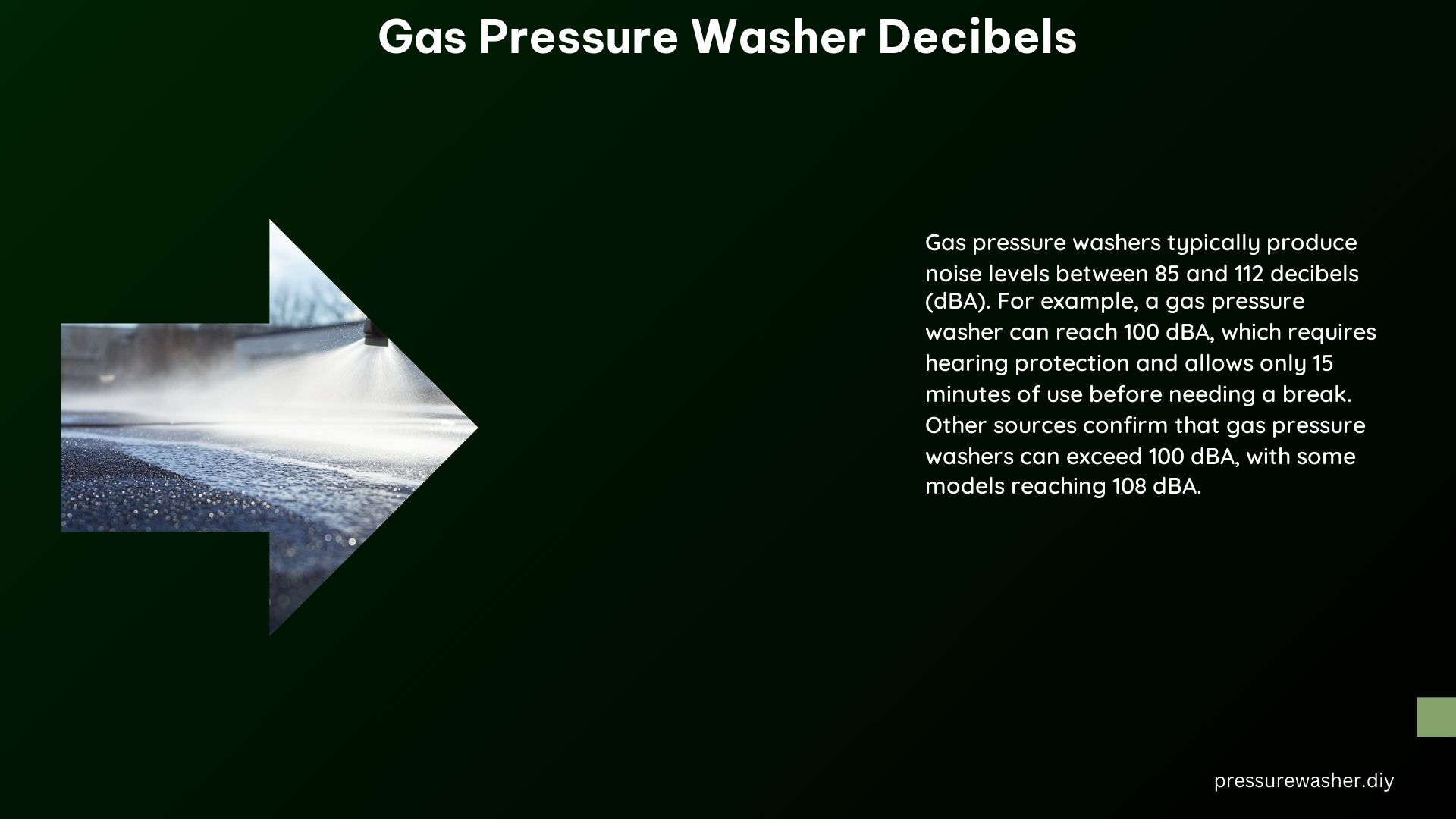Gas pressure washers are powerful cleaning tools that can tackle a wide range of outdoor tasks, from washing cars to cleaning patios and driveways. However, one of the primary concerns with these machines is the high decibel level they produce, which can be a nuisance to both the user and nearby residents. In this comprehensive guide, we’ll dive deep into the technical aspects of gas pressure washer decibels, providing you with a wealth of information to help you understand, manage, and potentially reduce the noise levels of your gas-powered pressure washer.
Typical Decibel Level of a Gas Pressure Washer
The typical decibel level of a gas pressure washer is around 100 decibels (dBA), which is significantly louder than an electric pressure washer, which typically operates at around 80 decibels (dBA). This difference in noise level is primarily due to the combustion engine used in gas pressure washers, which generates more noise than the electric motor used in electric pressure washers.
To put this into perspective, a decibel level of 100 dBA is equivalent to the sound of a jackhammer or a rock concert. This level of noise can be harmful to your hearing, and it’s essential to take appropriate precautions to protect your ears when operating a gas pressure washer.
Comparison to Electric Pressure Washer

As mentioned earlier, electric pressure washers are significantly quieter than their gas-powered counterparts, with a typical decibel level of around 80 dBA. This difference in noise level can be attributed to the fact that electric motors generate less noise than combustion engines.
| Pressure Washer Type | Typical Decibel Level |
|---|---|
| Gas Pressure Washer | 100 dBA |
| Electric Pressure Washer | 80 dBA |
The lower noise level of electric pressure washers can be a significant advantage for homeowners who live in residential areas or have concerns about disturbing their neighbors. Additionally, the quieter operation of electric pressure washers can make the cleaning experience more pleasant for the user.
Reducing Decibel Level with Maintenance or Modifications
If you’re the owner of a gas pressure washer and are concerned about the high decibel level, there are several steps you can take to reduce the noise output:
-
Use a Silencer or Muffler: Installing a silencer or muffler on the exhaust system of your gas pressure washer can significantly reduce the noise produced by the engine. These accessories are designed to muffle the sound of the engine’s exhaust, effectively lowering the overall decibel level.
-
Soundproofing: Placing the engine of your gas pressure washer in a soundproofing box or using soundproofing materials around it can help to contain the noise and prevent it from spreading. This can be an effective solution, especially if you’re using your pressure washer in a residential area.
-
Shock-Absorbing Pads: Using shock-absorbing pads under the pump of your gas pressure washer can help to reduce vibrations and, in turn, lower the noise level. These pads can effectively dampen the mechanical noise generated by the pump.
-
Sound-Absorbing Materials: Wrapping the pump of your gas pressure washer with sound-absorbing materials, such as foam or insulation, can help to dampen the noise produced by the machine.
-
Low Noise Nozzles: Using nozzles with larger hole diameters can reduce the noise level of your gas pressure washer by lessening the pressure at which the water is expelled.
-
Long Hose: Using a longer hose can move the gas pressure washer further away from the user, reducing the perceived noise level and creating a more comfortable working environment.
Technical Specifications
When it comes to the technical specifications of gas pressure washers, there are a few key factors to consider:
-
Noise Reduction Rating (NRR): The NRR needed for a gas pressure washer is typically around 22, indicating that hearing protectors are required when operating the machine. This means that users should wear appropriate hearing protection, such as earplugs or earmuffs, to safeguard their hearing.
-
Time Allowed: The allowed usage time for a gas pressure washer is typically around 15 minutes before hearing protectors are required. This is due to the high decibel level and the potential for hearing damage if the machine is used for an extended period without proper protection.
Conclusion
In conclusion, understanding the decibel levels of gas pressure washers is crucial for ensuring a safe and comfortable operating environment. By being aware of the typical noise levels, comparing them to electric pressure washers, and exploring various maintenance and modification techniques, you can effectively manage the noise output of your gas-powered pressure washer. Remember to always prioritize your safety and the well-being of those around you when using these powerful cleaning tools.
References
- University of Florida, Environmental Health and Safety. (n.d.). Noise Levels for Common Equipment. Retrieved from https://webfiles.ehs.ufl.edu/noiselvl.pdf
- Reddit. (2020). First time using a pressure washer and neighbor already complaining. Retrieved from https://www.reddit.com/r/homeowners/comments/gzo1z5/first_time_using_a_pressure_washer_and_neighbor/
- BISON. (2023). How to make gasoline pressure washer quieter? Retrieved from https://www.bisongenerator.com/Blog/make-gasoline-pressure-washer-quieter.html
- Bob Vila. (2021). Electric vs Gas Pressure Washer: Choosing the Right Cleaning Tool. Retrieved from https://www.bobvila.com/articles/electric-vs-gas-pressure-washer/
